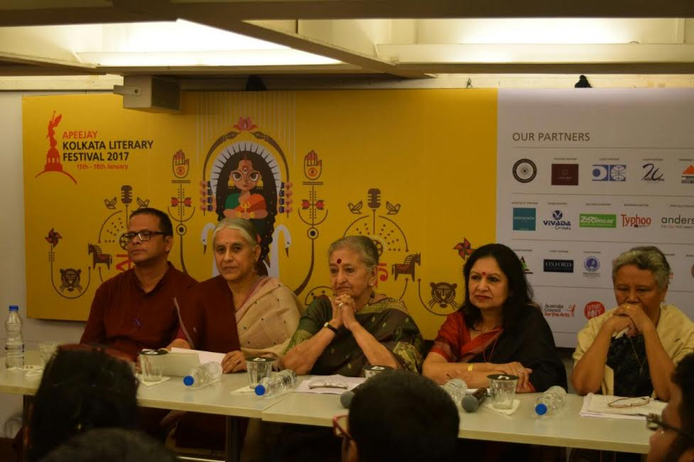What got me into attending the session on women’s writings of the Apeejay Kolkata Literary Festival 2017 (AKLF2017) was this particular theme which focused on women’s writings. For the first time, I found a platform where theorists, writers and activists had come together to talk of women’s writings.
Bharati Ray introduced the history of women’s writing in Bengal which dates back to nineteenth century and reflected upon the fact that the men who promoted it never thought of producing women writers. But once the women learnt, they began to write.
Supriya Chaudhuri talked about the early women writers of Bengal like Rassundari Dasi who published her first book in 1868. She had taught herself to read and write surreptitiously hiding Bangla alphabets on palmyra leaves, expressing herself in prose and poetry. Women writers became the answer to Julia Kristeva’s question: “Women are writing and the air is heavy with expectations. What will they write?”
Bharati Ray explained that in the earlier phase, unknown house wives wrote more than the well-known Swanakumari anonymously. They wrote journals and this was the discovery. Their discussion threw light on the evolution of women’s writing in Indian literature, with special reference to Bangla literature.
Esther Syiem explained how women use memories as tool, writing historiography of sorts, revisiting the oral. Bharati Ray said that in the context where women’s sexuality is only expressed in terms of reproduction, way back in 1930s, women had already started writing about their desires. One such example is the Bangla magazine, Kallol. In Urdu, such depiction was done by Ismat Chughtai.
Malashri Lal explained that in Urdu there were many writers who were rebels with a cause. She talked about Ismat Chughtai’s famous story, Lihaf which was sued. But the court couldn’t find anything wrong with the story simply because the vocabulary was so powerful. That means that it’s not necessary for a writer to be sexually explicit to express the sexual desires in writings. She gave the example of another writer, Krishna Soti who in her writing, E Ladki presents a conversation between two women, an old woman who is justifying her life as a mother and a young woman who denies the concept of motherhood.
On male authors’ take on women’s writings, Jerry Pinto explained his position as a man writing on feminism. He has written on Helen, the famous Bollywood actress and dancer who has danced for three generations of men and thereby challenged patriarchy in Bollywood where a woman’s screen-life is around five years compared to men who keep on surviving in the industry even after 35 years of their career. Another interesting aspect was that he equated shrill as an anti-feminist octave because it is laughed at and is the highest pitch.
When we are dealing with women’s writing in India, we can never ignore caste. This issue of caste was raised by Bharati Ray and Supriya Chaudhuri was asked about Telegu literature. She referred to Jerry Pinto’s translation of Ramdeo’s wife who was battered and marginalized. She agreed to the political angle of Jerry Pinto and gave examples from communist writings where there was a woman who stood up in a meeting and said “Why should my comrade beat me?” referring to her husband as a comrade. She also expressed the significant role of translation in bringing up these histories.
Talking about writings by Dalit women, Jerry Pinto explained that for Dalit women, power relation is sensitive to the man’s powerlessness outside and powerfulness inside. Dalit women are the earning members but they are oppressed. That is the point from where they have begun to write. Madam Power’s words reflect this notion: “I am not in his book. So I wrote my own book.”
This event organized at Oxford Book Store, Kolkata, on January 10, enlightened the audience about the history of women’s writings, true to its name, ‘Narichetna’, meaning consciousness of women.









.jpg)




0 Comments